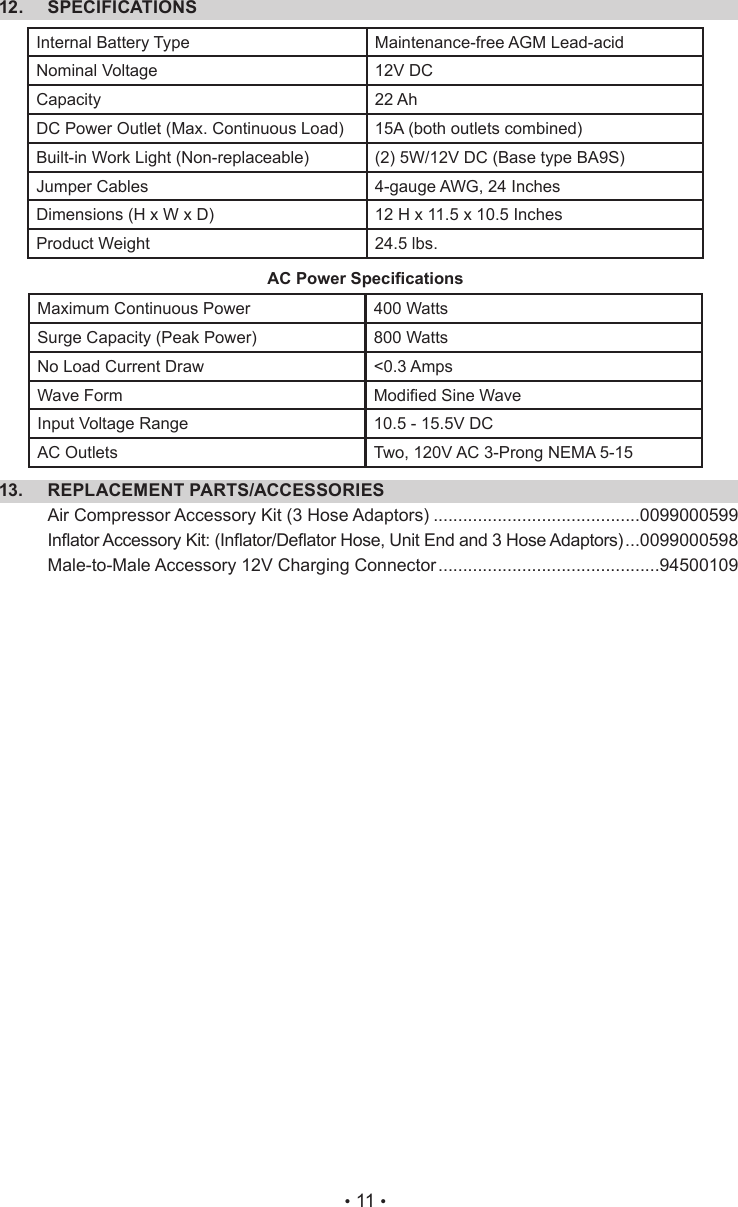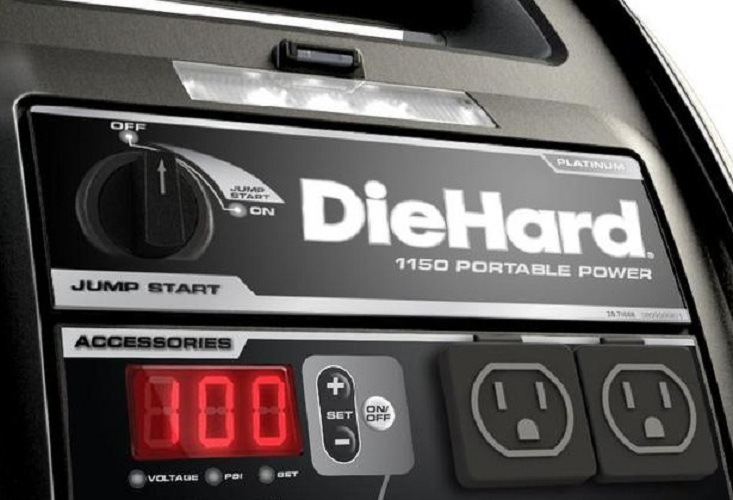Diehard Platinum Portable Power 1150 User Manual
•
- Diehard Portable Power 118 spinprod75131958 to the manual cba0457f-8f72-4ea9-9cd0-362f1cd08d46.
- OWNER'S MANUAL DieHard, Portable Power 1150 Jump Starter/DC Power Source Air Compressor, Inflator and AC Power Model No. 200.71488 CAUTION: Read all Safety Rules and Operating Instructions, and follow them with each use of this product. Sears, Roebuck and Co., Hoffman Estates, IL 60179 U.S.A.
Portable Power 1150 OPERATOR’S MANUAL Model No. 28.71988 Sears Brands Management Corporation, Hoffman Estates, IL 60179 U.S.A. Read and follow all Safety Rules and Operating Instructions before Every Use of this Product. SAvE THESE INSTRUCTIONS. Charge Up Your Vehicle Anywhere with the DieHard Platinum Charger Portable Power 1150. DieHard's Platinum Portable Power 1150 is a versatile portable power source, jump starter and compressor ideal for use with vehicles that need up to 1150 peak amps for a jump start and larger capacity charging with 54 hours of 12V DC power provided. I'm sorry that you are having difficulties with your Diehard Portable Power 1150. I did some research for you at managemylife.com and found the owners manual that may assist you until your expert can respond. I have attached the link below. I hope it will assist you until your expert can respond.
Read online or download PDF. Page 4 / 12. Sears Diehard Portable Power 118 User Manual. Sears For the car. AC Power, DC Power, USB charging, Automatic Digital Air Compressor and 1150 Peak Amps are all at your fingertips with the DieHard 71688 Platinum Portable Power. A must-have for larger vehicles, Diehard's multi-purpose charger and jump starter delivers exceptional performance with more options for powering all your devices.
3
•
Clean the battery terminals before using the jump starter. During cleaning, keep airborne
2.15
corrosion from coming into contact with your eyes, nose and mouth. Use baking soda
and water to neutralize the battery acid and help eliminate airborne corrosion. Do not

touch your eyes, nose or mouth.
Determine the voltage of the battery by referring to the vehicle owner’s manual and
2.16
make sure that the output voltage of the jump starter is correct.
Make sure that the jump starter cable clips make tight connections.
2.17
FOLLOW THESE STEPS WHEN CONNECTING TO A BATTERY
3.
A SPARK NEAR THE BATTERY MAY CAUSE
A BATTERY EXPLOSION. TO REDUCE THE
RISK OF A SPARK NEAR THE BATTERY:
Attach the output cables to the battery
3.1
and chassis as indicated below. Never allow the
output clips to touch each other.
Position the DC cables to reduce the risk of damage by the hood, door and moving or

3.2
hot engine parts.
NOTE: If it is necessary to close the hood during the charging process,
ensure that the hood does not touch the metal part of the battery clips or cut the
insulation of the cables.
Stay clear of fan blades, belts, pulleys and
3.3
other parts that can cause injury.
Check the polarity of the battery posts. The
3.4
POSITIVE (POS, P, +) battery post usually
has a larger diameter then the NEGATIVE
(NEG, N, -) post.
Determine which post of the battery is
3.5
grounded (connected) to the chassis. If the
negative post is grounded to the chassis
(as in most vehicles), see step 3.6. If the
positive post is grounded to the chassis,
see step 3.7.
For a negative-grounded vehicle, connect
3.6
the POSITIVE (RED) clip from the jump
starter to the POSITIVE (POS, P, +)
ungrounded post of the battery. Connect the NEGATIVE (BLACK) clip to the vehicle
chassis or engine block away from the battery. Do not connect the clip to the carburetor,
fuel lines or sheet-metal body parts. Connect to a heavy gauge metal part of the frame
or engine block.
For a positive-grounded vehicle, connect the NEGATIVE (BLACK) clip from the jump
3.7
starter to the NEGATIVE (NEG, N, -) ungrounded post of the battery. Connect the
POSITIVE (RED) clip to the vehicle chassis or engine block away from the battery. Do
not connect the clip to the carburetor, fuel lines or sheet-metal body parts. Connect to a
heavy gauge metal part of the frame or engine block.
When disconnecting the jump starter, turn all switches to off (if applicable), remove the
3.8
clip from the vehicle chassis and then remove the clip from the battery terminal.
GROUNDING AND AC POWER CORD CONNECTIONS
4.
RISK OF ELECTRIC SHOCK OR FIRE.
The jump starter charger is for use on a nominal 120-
4.1
volt circuit. The plug must be plugged into an outlet that is
properly installed and grounded in accordance with all local
codes and ordinances. The plug pins must fit the receptacle
(outlet). Do not use with an ungrounded system.
4.2
Never alter the AC cord or plug provided – if it does not fit the outlet,
have a proper grounded outlet installed by a qualified electrician. An improper
connection can result in a risk of an electric shock or electrocution.
NOTE: Pursuant to
Canadian Regulations, use of an adapter plug is not allowed in Canada. Use of an
adapter plug in the United States is not recommended and should not be used.

NEGATIvE GROUNDED SYSTEM